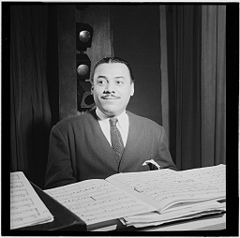Billy Kyle
William Osborne "Billy" Kyle (* 14. July 1914 in Philadelphia ; † 23. February 1966 in Youngstown , Ohio ) was an American jazz - pianist of Swing .
Life
Billy Kyle began playing the piano in high school and worked with Tiny Bradshaw , Lucky Millinder, and the Mills Blue Rhythm Band in the early 1930s . In 1938 he became a member of John Kirby's band, where he soon became a well-known musician through his playing, which was influenced by Earl Hines but always had a personal style, such as the tracks I May Be Wrong or Opus 5 from 1939. In this one During this period, he also made recordings with Timmie Rosenkrantz (1938), Lionel Hampton ( Muskrat Ramble 1938), Nat Gonella , the Spencer Trio ( Baby Won't You Please Come Home , 1938), Rex Stewart ( Cherry, Solid Rock, Diga Diga Do , 1940), Henry Red Allen , Buster Bailey , Pete Brown , Jack Teagarden, and others. Billy Kyle also recorded several records under his own name ( Fishing Up A Date, Between Sets 1938, I Want You I Need You , 1946).
In 1942 he left John Kirby, worked again briefly with him after his military service in World War II and then played with Sy Oliver . From the early 1950s he played in theater orchestras on Broadway , including almost three years in the musical production Guys and Dolls . From 1953 was Kyle member of the All Stars - Formation of Louis Armstrong . He was involved in the recording of the Plays WC Handy album and took part in numerous world tours. Kyle played for the All Stars until his death in 1966 .
When playing the piano, Billy Kyle had developed “a partly percussive, partly brass line-oriented" single notes "style, almost completely without the left hand. His elegantly sparkling game, spiced with fun ideas, was particularly popular with combo leaders ”. (Kunzler)
literature
- Martin Kunzler : Jazz-Lexikon , Reinbek, Rowohlt, 1988.
- Richard Cook , Brian Morton : The Penguin Guide of Jazz on CD . 6th edition. Penguin, London 2002, ISBN 0-14-051521-6 .
- Bielefeld Catalog 1988.
Web links
| personal data | |
|---|---|
| SURNAME | Kyle, Billy |
| ALTERNATIVE NAMES | Kyle, William Osborne |
| BRIEF DESCRIPTION | American swing jazz pianist |
| DATE OF BIRTH | July 14, 1914 |
| PLACE OF BIRTH | Philadelphia |
| DATE OF DEATH | February 23, 1966 |
| Place of death | Youngstown , Ohio |
